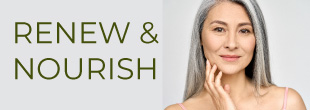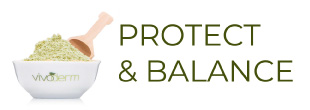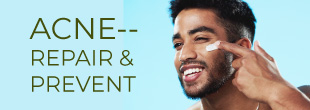
Skincare Treatments for Men
While traditionally overlooked, men’s skincare is now recognized as essential for maintaining healthy, vibrant skin and combating the effects of aging, pollution, and stress. A basic skincare routine tailored to men’s needs can make a significant difference in the appearance and health of their skin.
The steps are simple 1-2-3. Basic skincare starts with cleansing, toning/exfoliating and moisturizing.
The first step in a successful skincare routine for men is cleansing. Men’s skin tends to be oilier and thicker than women’s, making it important to choose a cleanser that effectively removes dirt, oil, and impurities without stripping the skin of its natural oils. A gentle, pH-balanced cleanser is ideal for daily use, helping to prevent breakouts and maintain a clear complexion. The Vivoderm cream cleanser offers exceptional daily cleansing with added moisture that won’t strip skin’s natural protective barrier.
After cleansing, it’s important to exfoliate regularly to remove dead skin cells and unclog pores. Exfoliating also helps to improve skin texture and reduce the appearance of fine lines and wrinkles. Men should use a mild exfoliator 2-3 times a week, focusing on areas prone to oiliness or roughness, such as the T-zone (forehead, nose, and chin). This can be found in using a toner or an exfoliating mask
Moisturizing is another essential step in a skincare routine for men. Even oily skin needs hydration, so it’s important to choose a lightweight, oil-free moisturizer that won’t clog pores. Moisturizing helps to keep the skin hydrated, smooth, and supple, while also providing a protective barrier against environmental damage.
In addition to these basic steps, men may also benefit from using targeted skincare products, such as serums or treatments, to address specific skin concerns. For example, a vitamin C serum can help to brighten dull skin and reduce dark spots, while a retinol treatment can help to reduce the appearance of fine lines and wrinkles.
Finally, it’s important for men to protect their skin from the sun’s harmful UV rays. Sunscreen should be applied daily, even on cloudy days or during the winter months, to prevent sun damage and premature aging. Look for a broad-spectrum sunscreen with an SPF of at least 30, and reapply regularly, especially if spending extended periods of time outdoors.
In conclusion, skincare for men is essential for maintaining healthy, youthful-looking skin. By following a simple yet effective skincare routine, men can keep their skin looking its best and protect it from the damaging effects of the environment.
Tips to Treat Acne
Men can treat acne using a variety of methods, including over-the-counter products, prescription medications, and lifestyle changes. Here are some effective ways to treat acne in men:
Topical Treatments: Over-the-counter topical treatments containing ingredients like benzoyl peroxide, salicylic acid, or sulfur can help to unclog pores, reduce inflammation, and kill acne-causing bacteria. These products are available in various forms, such as gels, creams, and spot treatments.
Prescription Medications: For moderate to severe acne, a dermatologist may prescribe topical or oral medications. Topical retinoids, antibiotics, and azelaic acid are commonly prescribed to treat acne. Oral medications such as antibiotics, hormonal therapy, or isotretinoin may be recommended for more severe cases.
Healthy Lifestyle: A healthy lifestyle can also help manage acne. Eating a balanced diet, staying hydrated, getting enough sleep, and reducing stress can all contribute to clearer skin.
Avoiding Irritants: Men should avoid using harsh skincare products, such as those containing alcohol or fragrances, which can irritate the skin and worsen acne. Shaving carefully with a sharp razor and using a gentle shaving cream can also help prevent irritation.
Professional Treatments: In addition to these methods, men with acne may benefit from professional treatments such as chemical peels, microdermabrasion, or laser therapy, which can help improve acne and acne scarring.
It’s important for men with acne to be patient, as it can take time to see results from acne treatments. Consistency with a skincare routine and following the advice of a dermatologist can help improve acne and prevent future breakouts.







 If you suffer from sensitive or dry, delicate skin, you already know how difficult it can be to find a skin care product that does not cause a negative reaction. However, have you considered many other kinds of chemicals you are exposed to every day? Many unsuspecting products, like household cleaners, air pollution and even industrial chemicals in your furniture can induce inflammation in susceptible individuals. If you suffer from dry or sensitive skin, you are more at risk for reactions, especially if you are already experiencing extreme dryness or eczema symptoms.
If you suffer from sensitive or dry, delicate skin, you already know how difficult it can be to find a skin care product that does not cause a negative reaction. However, have you considered many other kinds of chemicals you are exposed to every day? Many unsuspecting products, like household cleaners, air pollution and even industrial chemicals in your furniture can induce inflammation in susceptible individuals. If you suffer from dry or sensitive skin, you are more at risk for reactions, especially if you are already experiencing extreme dryness or eczema symptoms.